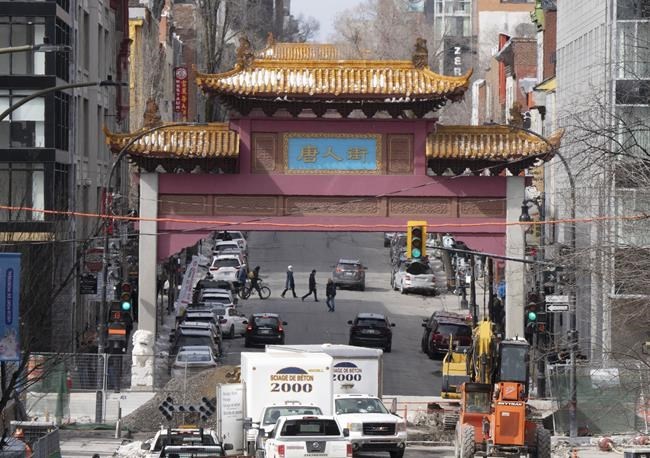MONTREAL — Residents of Montreal's Chinatown say they're feeling vulnerable and afraid because of rising crime and drug use in their neighbourhood, and they are urging the city to deploy more police to tackle the problem.
A group of residents and merchants told a news conference Thursday they're being exposed to acts of vandalism, harassment and violence as a result of an increase in drug trafficking and homelessness.
John Liu, the priest at the local Chinese Catholic church, said he was kicked by a woman outside his church last month. His church doors have been vandalized, and parishioners have had their car mirrors smashed, he added.
"Even our parishioners are afraid of going to church," said Liu, who also manages an organization that helps seniors.
Several residents and business owners at the news conference blamed a homeless shelter, opened during the COVID-19 pandemic, that they say has attracted drug dealers to the neighbourhood and has increased crime, disorder and unhygienic conditions, such as streets littered with human waste and garbage.
Bryant Chang, vice-president of the Chinese Association of Montreal, says the homeless population has exploded. "Chinatown should not be the dumping ground for the homeless, and cohabitation is not the right concept, or a long-term solution to such a complex social problem," he said.
At the news conference, some suggested that homeless people from the city's Village district — which is also struggling with homelessness, addiction, and crime — are increasingly moving to Chinatown.
While the shelter in Chinatown, run by an organization called Société de développement social, is scheduled to close this fall, the group of residents are concerned that Montreal's mayor has suggested another could open in the district.
They're calling for police to increase foot patrols and to enforce all laws and bylaws, and for authorities to hold wider public consultations with residents about the area's safety and quality of life. They also want to prevent new homeless shelters from opening in Chinatown.
In a statement, the city said Chinatown, like other parts of the city and country, is facing a rise in complex social issues driven by mental health problems, addiction and housing shortages.
It said it was increasing the presence of police, as well as its social mediation team on the ground, while working on the bigger issues such as housing and specialized services.
"We remain determined to continue to deploy all the necessary efforts to maintain safety in the sector, to stimulate its economic vitality and preserve the historic character of our Chinatown," read the statement by the city's executive committee.
Christiane Jansen, who has lived in the area for more than 30 years, said the yelling, fights and drug use she has witnessed, has made her nervous to leave her home at night.
"They fight over drugs, there is screaming, it's not tolerable," she said.
Jansen, like many at the news conference, acknowledged that people struggling with addiction and homelessness need somewhere to go. But she said the solution is not shelters but initiatives that tackle the root of the problem, such as permanent housing and drug treatment facilities.
Fo Niemi, founder of the Center for Research-Action on Race Relations, a non-profit civil rights organization that often defends victims of alleged police abuse, said the group wants a crackdown on criminal behaviours such as drug crimes and assault, not on homelessness itself. He said the area has always had some homeless people living there, and that many residents and businesses offer them food.
But the newer group, Niemi said, are people with "very threatening conduct" that is menacing Chinatown's population, many of whom are immigrant seniors with their own vulnerabilities and whose voices have been lost.
Sam Watts, CEO of the Welcome Hall Mission, says the roughly 100 people using the Chinatown shelter are "more complex cases" that are harder to resolve.
He said part of the problem stems from the "suboptimal" nature of the shelter, which he refused to help run because it has poor facilities and is only open at night. He said that to be effective, shelters need to operate 24/7 and offer a range of services that address their clients' needs and help direct them to housing.
He said the bigger solution to the complex problems of homelessness isn't policing — which only displaces the problem — or trying to please discontented residents.
"The answer is actually to come up with solutions for the people in need," he said. "And if we do that, the interesting thing is, we end up solving both problems."
This report by The Canadian Press was first published Aug. 17, 2023.
Morgan Lowrie, The Canadian Press
Note to readers: This is a corrected story. A previous version said Sam Watts was CEO of the Old Brewery Mission, but he is in fact with the Welcome Hall Mission.

